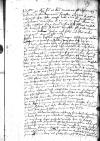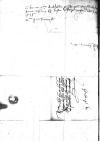 AAWO, AB, D.8, f. 79r
AAWO, AB, D.8, f. 79r
Reverendissime in Christo Pater et Domine, amice et frater observande.
Salutem et secundos rerum successus Vestrae Reverendissimae Dominationi imprimis vehementer opto.
1535-07-31⌊Hodie1535-07-31⌋ accepi litteras <Vestrae> Reverendissimae Dominationis per praesentium exhibitorem, cursorem Dominationis Vestrae Reverendissimae, cui ex quo illico, ut mihi notificet Dominatio Vestra Reverendissima Cracow (Kraków, Cracovia), city in southern Poland, Małopolska, on the Vistula river, from 1038 capital of the Kingdom of Poland⌊CracoviamCracow (Kraków, Cracovia), city in southern Poland, Małopolska, on the Vistula river, from 1038 capital of the Kingdom of Poland⌋ versus sese conferet, tradidi illi litteras ad dominum Wojciech Kijewski (Wojciech Kijowski, Wojciech Kilewski, Albert Kijowski) (*ca. 1495 – †1566), from 1518 scribe in the royal chancellery; 1531-1535 secretary to Vice-Chancellor Piotr Tomicki; from 1532 Dean of the Collegiate Chapter in Sącz; from 1523 Canon of Kulm (Chełmno); from 1532 Canon of Ermland (Warmia); from 1533 Canon of Włocławek; from 1547 Canon of Cracow; representative of the Ermland Church at the royal court (KOPICZKO 2, p. 147; SBKW, p. 112-113)⌊Albertum KyoffskiWojciech Kijewski (Wojciech Kijowski, Wojciech Kilewski, Albert Kijowski) (*ca. 1495 – †1566), from 1518 scribe in the royal chancellery; 1531-1535 secretary to Vice-Chancellor Piotr Tomicki; from 1532 Dean of the Collegiate Chapter in Sącz; from 1523 Canon of Kulm (Chełmno); from 1532 Canon of Ermland (Warmia); from 1533 Canon of Włocławek; from 1547 Canon of Cracow; representative of the Ermland Church at the royal court (KOPICZKO 2, p. 147; SBKW, p. 112-113)⌋ soli praesentandas. Alia non habe... illegible⌈...... illegible⌉(?) habeo ad praesens ad illam aulam scriptione dignum perferendum.
Sessio loci in consilio regis et regni consiliariorum ita per superinscribed⌈perper superinscribed⌉ me occupata et tenta fuit: post superinscribed⌈postpost superinscribed⌉ Plocensem datus fuit mihi locus, qui a domino Łukasz Watzenrode (*1447 – †1512), Doctor of canon law, uncle of Nicolaus Copernicus.; 1475 - Kulm (Pol. Chełmno) canon; 1478 - Włocławek canon; 1479 - Ermland canon; 1482 - archdeacon of Kalisz and judical vicar of Gniezno; 1485 - Gniezno canon and scholastic of Łęczyca; 1488 - coadjutor of Ermland bishop Mikołaj Tungen; 1489 - Ermland bishop (against King Kazimierz Jagiellon's will); councillor of Polish Kings Jan Olbracht, Aleksander and Sigismund I Jagiellons. (Oracki, 200-201)⌊LucaŁukasz Watzenrode (*1447 – †1512), Doctor of canon law, uncle of Nicolaus Copernicus.; 1475 - Kulm (Pol. Chełmno) canon; 1478 - Włocławek canon; 1479 - Ermland canon; 1482 - archdeacon of Kalisz and judical vicar of Gniezno; 1485 - Gniezno canon and scholastic of Łęczyca; 1488 - coadjutor of Ermland bishop Mikołaj Tungen; 1489 - Ermland bishop (against King Kazimierz Jagiellon's will); councillor of Polish Kings Jan Olbracht, Aleksander and Sigismund I Jagiellons. (Oracki, 200-201)⌋ alternatis vicibus cum Plocensi tentus fuit. Contendi ea de causa cum Jan Chojeński (*1486 – †1538), 1523 royal secretary, 1526-1537 Grand Secretary; 1531-1535 Bishop of Przemyśl, 1535-1537 Bishop of Płock, 1537-1538 Bishop of Cracow, 1537-1538 Grand Chancellor of the Crown (WYCZAŃSKI 1990, p. 248-249; PSB 3, p. 396-399)⌊moderno PlocensiJan Chojeński (*1486 – †1538), 1523 royal secretary, 1526-1537 Grand Secretary; 1531-1535 Bishop of Przemyśl, 1535-1537 Bishop of Płock, 1537-1538 Bishop of Cracow, 1537-1538 Grand Chancellor of the Crown (WYCZAŃSKI 1990, p. 248-249; PSB 3, p. 396-399)⌋ longa certatione, ille mihi subivit, quod tacuissem seu silentio praetermisissem, vel saltem tolerassem hunc locum sic possidere per dominum Rafał Leszczyński (†1527), diplomat, studied in Padua; secretary of Sigismund Jagiellon as duke of Głogów; 1509 starosta of Człuchów; 1507-1520 royal secretary; 1510 canon of Poznań; 1512 - of Gniezno; 1518 - of Cracow; 1518 castellan of Ląd; 1520 bishop of Przemyśl; 1522 - of Płock; 1507, 1508, 1512, 1513, 1514 royal envoy to the Estates and town of Prussia; 1507, 1511, 1516 - to the Teutonic Order; 1509, 1514, 1515, 1517, 1518 - to the emperor; 1509, 1515 - to Venice and Rome; 1511, 1519 - to the Roman Empire; 1517 - to Western Pomerania (WYCZAŃSKI 1990, p. 257; Urzędnicy 1/2)⌊RaphaelemRafał Leszczyński (†1527), diplomat, studied in Padua; secretary of Sigismund Jagiellon as duke of Głogów; 1509 starosta of Człuchów; 1507-1520 royal secretary; 1510 canon of Poznań; 1512 - of Gniezno; 1518 - of Cracow; 1518 castellan of Ląd; 1520 bishop of Przemyśl; 1522 - of Płock; 1507, 1508, 1512, 1513, 1514 royal envoy to the Estates and town of Prussia; 1507, 1511, 1516 - to the Teutonic Order; 1509, 1514, 1515, 1517, 1518 - to the emperor; 1509, 1515 - to Venice and Rome; 1511, 1519 - to the Roman Empire; 1517 - to Western Pomerania (WYCZAŃSKI 1990, p. 257; Urzędnicy 1/2)⌋, per consequens non esset dignum ipsi, ut nunc cedere deberet etc. Ego allegavi, quod nescirem, quomodo sessio temporibus his tanta fuerit, non esset meum colligere vota, sed secundum ius et veterem consuetudinem exstaret hoc et superinscribed⌈etet superinscribed⌉ adhuc penes marscalliensem regni itaque illius error seu dolus non potest nec mihi, nec Ermland (Warmia, Varmia), diocese and ecclesiastical principality in northeastern Poland, 1466-1772 within the Kingdom of Poland, Royal Prussia⌊ecclesiae meaeErmland (Warmia, Varmia), diocese and ecclesiastical principality in northeastern Poland, 1466-1772 within the Kingdom of Poland, Royal Prussia⌋ in aliquo honorem subrepere. De post aliquando fui ... illegible⌈...... illegible⌉ interpellatus pro voto dando ante Plocensem, sed hoc non frequenter, at quando debito ordine non fuerim rogatus, de gravamine fui et contemptu protestatus. In ultima isthinc mea abitione post coronationem Sigismund II Augustus Jagiellon (Zygmunt II August) (*1520 – †1572), 1529-1572 Grand Duke of Lithuania (ruled from 1544); 1530-1572 King of Poland (crowned vivente rege (ruled from 1548, after the death of his father); son of Sigismund I Jagiellon and Bona Sforza⌊iunioris regisSigismund II Augustus Jagiellon (Zygmunt II August) (*1520 – †1572), 1529-1572 Grand Duke of Lithuania (ruled from 1544); 1530-1572 King of Poland (crowned vivente rege (ruled from 1548, after the death of his father); son of Sigismund I Jagiellon and Bona Sforza⌋ Sigismund I Jagiellon (Zygmunt I) (*1467 – †1548), King of Poland and Grand Duke of Lithuania (1506-1548); Duke of Głogów (Glogau) (1499-1506), Duke of Opava (1501-1506), Governor of Silesia (1504-1506); son of King Kazimierz IV Jagiellon and Elisabeth of Austria⌊rex seniorSigismund I Jagiellon (Zygmunt I) (*1467 – †1548), King of Poland and Grand Duke of Lithuania (1506-1548); Duke of Głogów (Glogau) (1499-1506), Duke of Opava (1501-1506), Governor of Silesia (1504-1506); son of King Kazimierz IV Jagiellon and Elisabeth of Austria⌋ pollicitus est mihi finem huius rixae facere velle in proximo conventu, interea in nullo Polonico conventu comparui, sunt tamen multi domini, qui recordabantur et ipse rex ita, ut a me praemissum paper damaged⌈[um]um paper damaged⌉ est, olim observatum esse, numquam sedit penes me in superiori loco episcopus P... illegible⌈...... illegible⌉locensis, nec hoc tolerassem, vel sedit in alio latiore, vel super scabello suo. Ideo marscalliensis exigit votum a nobis duobus pro nutu suo, tunc illum, tunc me primum interrogando.
De post sedit penes me Primisliensis, dehinc praecessor Dominationis Vestrae Reverendissimae, demum Chelmensis etc. et sic illo tempore, de quo memini servatum et tentum fuit, quoad sessiones locorum in Royal Council of Poland ⌊regio consilioRoyal Council of Poland ⌋.
Conventum Michaelis consuetum celebrandum servabo, si alius mihi non indicatus fuerit et per valetudinem valuero in locoque consueto. Albrecht I von Hohenzollern-Ansbach (Albrecht von Brandenburg) (*1490 – †1568), 1511-1525 Grand Master of the Teutonic Order; from 1525 to his death Duke in Prussia as a liegeman of the Polish king; son of Friedrich V of Brandenburg der Ältere and Sophia Jagiellon (daughter of Casimir IV Jagiellon), nephew of Sigismund I, King of Poland; founder of the university in Königsberg (1544)⌊Illustrissimus duxAlbrecht I von Hohenzollern-Ansbach (Albrecht von Brandenburg) (*1490 – †1568), 1511-1525 Grand Master of the Teutonic Order; from 1525 to his death Duke in Prussia as a liegeman of the Polish king; son of Friedrich V of Brandenburg der Ältere and Sophia Jagiellon (daughter of Casimir IV Jagiellon), nephew of Sigismund I, King of Poland; founder of the university in Königsberg (1544)⌋ dixit mihi diem veniendi huc VII Augusti, nisi insuspicato impedimento praepeditus fuerit. Ex Gdańsk (Danzig, Dantiscum), city in northern Poland, on the Bay of Gdańsk at the mouth of the Vistula, on the Baltic, the biggest and wealthiest of the three Great Prussian Cities (Gdańsk, Thorn (Toruń), and Elbing (Elbląg)) with representation in the Council of Royal Prussia; a member of the Hanseatic League⌊GdanoGdańsk (Danzig, Dantiscum), city in northern Poland, on the Bay of Gdańsk at the mouth of the Vistula, on the Baltic, the biggest and wealthiest of the three Great Prussian Cities (Gdańsk, Thorn (Toruń), and Elbing (Elbląg)) with representation in the Council of Royal Prussia; a member of the Hanseatic League⌋ mihi autem scriptum est ex Pomerania⌊PomeraniaPomerania⌋ rumorem venisse de morte Joachim I of Brandenburg Nestor (Joachim I von Hohenzollern) (*1484 – †1535), 1499-1535 Prince-Elector of Brandenburg; son of Johann Cicero, Elector of Brandenburg, and Margarete of Thuringia⌊IoachimiJoachim I of Brandenburg Nestor (Joachim I von Hohenzollern) (*1484 – †1535), 1499-1535 Prince-Elector of Brandenburg; son of Johann Cicero, Elector of Brandenburg, and Margarete of Thuringia⌋ mar superinscribed⌈rr superinscribed⌉chionis senioris. A Joachim II of Brandenburg Hector (Joachim II von Hohenzollern) (*1505 – †1571), son of Joachim I Nestor and Elisabeth von Oldenburg, 1524-1534 husband of Duchess Magdalena of Saxony, later (from 1535) of Jadwiga Jagiellon, daughter of King Sigismund I Jagiellon; 1535-1571 Prince-Elector of Brandenburg⌊principeJoachim II of Brandenburg Hector (Joachim II von Hohenzollern) (*1505 – †1571), son of Joachim I Nestor and Elisabeth von Oldenburg, 1524-1534 husband of Duchess Magdalena of Saxony, later (from 1535) of Jadwiga Jagiellon, daughter of King Sigismund I Jagiellon; 1535-1571 Prince-Elector of Brandenburg⌋ nec ex Königsberg (Królewiec, Mons Regius, Regiomontium), city in Ducal Prussia, on the mouth of the Pregel (Pregoła) river, capital city of Ducal Prussia; today Kaliningrad in Russia⌊Monte RegioKönigsberg (Królewiec, Mons Regius, Regiomontium), city in Ducal Prussia, on the mouth of the Pregel (Pregoła) river, capital city of Ducal Prussia; today Kaliningrad in Russia⌋ de Joachim I of Brandenburg Nestor (Joachim I von Hohenzollern) (*1484 – †1535), 1499-1535 Prince-Elector of Brandenburg; son of Johann Cicero, Elector of Brandenburg, and Margarete of Thuringia⌊illius principisJoachim I of Brandenburg Nestor (Joachim I von Hohenzollern) (*1484 – †1535), 1499-1535 Prince-Elector of Brandenburg; son of Johann Cicero, Elector of Brandenburg, and Margarete of Thuringia⌋ obitu nihil audivimus, nisi quod superinscribed⌈quodquod superinscribed⌉ illa protestatio me aliquantulum pavorosum facit, ut superinscribed in place of crossed-out quod ⌈quod utut superinscribed in place of crossed-out quod ⌉ scribit Albrecht I von Hohenzollern-Ansbach (Albrecht von Brandenburg) (*1490 – †1568), 1511-1525 Grand Master of the Teutonic Order; from 1525 to his death Duke in Prussia as a liegeman of the Polish king; son of Friedrich V of Brandenburg der Ältere and Sophia Jagiellon (daughter of Casimir IV Jagiellon), nephew of Sigismund I, King of Poland; founder of the university in Königsberg (1544)⌊duxAlbrecht I von Hohenzollern-Ansbach (Albrecht von Brandenburg) (*1490 – †1568), 1511-1525 Grand Master of the Teutonic Order; from 1525 to his death Duke in Prussia as a liegeman of the Polish king; son of Friedrich V of Brandenburg der Ältere and Sophia Jagiellon (daughter of Casimir IV Jagiellon), nephew of Sigismund I, King of Poland; founder of the university in Königsberg (1544)⌋, nisi praepeditus fuero. Haec sub sacra fratrum fide.
 AAWO, AB, D.8, f. 79v
AAWO, AB, D.8, f. 79v
Cum his me Reverendissimae Dominationi Vestrae diligenter commendo, quam Deus felicibus saeculis hidden by binding⌈[ulis]ulis hidden by binding⌉ servet vigentem.


 AAWO, AB, D.8, f. 79v
AAWO, AB, D.8, f. 79v